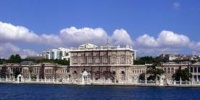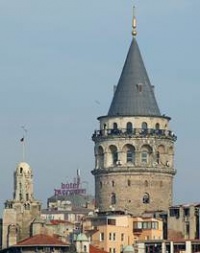Dolmabahce Palace and Galata Tower
Departure to the royal residence of Ottoman Sultans, the sumptuous Dolmabahce Palace.  During the 19th century, westernization of the Ottoman Empire which became an important trend was also felt in the architecture of the time. Dolmabahce Palace was built under such an influence between 1843 and 1856 by Sultan Abdulmecit. The site of the palace was obtained by filling a small bay on the Bosphorus, thus giving the palace its name which means “filled garden.” Its interior decoration is famed for a great collection of European antiques, its furniture and a Turkish bath in alabaster. Covering an area of 25 hectares, the palace consists of 285 rooms and 46 halls among which figures a large reception hall supported by 56 columns, also featuring a chandelier which weighs 4.5 tons. Approximately 600 paintings adorn the walls and specially woven, very beautiful Hereke carpets of huge dimensions cover the palace floors.
During the 19th century, westernization of the Ottoman Empire which became an important trend was also felt in the architecture of the time. Dolmabahce Palace was built under such an influence between 1843 and 1856 by Sultan Abdulmecit. The site of the palace was obtained by filling a small bay on the Bosphorus, thus giving the palace its name which means “filled garden.” Its interior decoration is famed for a great collection of European antiques, its furniture and a Turkish bath in alabaster. Covering an area of 25 hectares, the palace consists of 285 rooms and 46 halls among which figures a large reception hall supported by 56 columns, also featuring a chandelier which weighs 4.5 tons. Approximately 600 paintings adorn the walls and specially woven, very beautiful Hereke carpets of huge dimensions cover the palace floors. Continue to visit the Galata Tower which was built by the Genoese colony as part of their town defense fortifications in the 14C. In Genoese sources it was named Christea Turris (Tower of Christ). It was altered considerably, particularly by the addition of the upper parts under the Ottomans during the course of the centuries. It was used at different times as a prison and a watch tower for fires. In 1967, the tower was restored and an elevator was added. The present height of the tower is 63m/ 206 ft. Today two top floors serve as a restaurant with folkloric shows. During the daytime it is open to visitors for panoramic views of the region. In the 17C, during reign of the Ottoman Sultan Murat IV, Hazerfen Ahmet Celebi, a scholor whose first name means “a thousand sciences”, managed to fly by wearing rush-work wings, from the top of the Galata Tower to Uskudar, an Asian settlement opposite and across the Bosphorous. An excited crowd including the sultan watched him achieve this feat. Sultan Murat admires Hezarfen but he was also afraid that his unusual ability would win him excessive power. The Sultan gave him a purse of gold and declared: “This man is one to be feared. He can do anything he wishes. The presence of such men is not auspicious”. Hazerfen was then exiled to Algeria where he died broken hearted far from home.
Continue to visit the Galata Tower which was built by the Genoese colony as part of their town defense fortifications in the 14C. In Genoese sources it was named Christea Turris (Tower of Christ). It was altered considerably, particularly by the addition of the upper parts under the Ottomans during the course of the centuries. It was used at different times as a prison and a watch tower for fires. In 1967, the tower was restored and an elevator was added. The present height of the tower is 63m/ 206 ft. Today two top floors serve as a restaurant with folkloric shows. During the daytime it is open to visitors for panoramic views of the region. In the 17C, during reign of the Ottoman Sultan Murat IV, Hazerfen Ahmet Celebi, a scholor whose first name means “a thousand sciences”, managed to fly by wearing rush-work wings, from the top of the Galata Tower to Uskudar, an Asian settlement opposite and across the Bosphorous. An excited crowd including the sultan watched him achieve this feat. Sultan Murat admires Hezarfen but he was also afraid that his unusual ability would win him excessive power. The Sultan gave him a purse of gold and declared: “This man is one to be feared. He can do anything he wishes. The presence of such men is not auspicious”. Hazerfen was then exiled to Algeria where he died broken hearted far from home.
Operates on: Saturday, Apr 27
Duration: 13:00 – 18:00
Price: 50 Euro per person
Minimum number of guests: 16

















